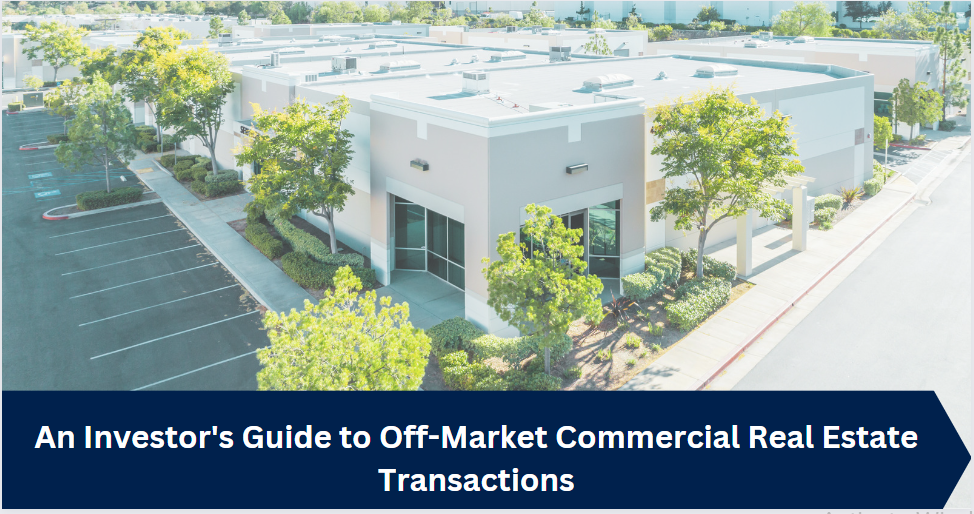Commercial real estate (CRE) transactions are marketed and brokered by a real estate investment broker/agent, and listed on a multiple listing service (MLS) such as CREXI or LoopNet/Costar. But some investors tap into the potential of off-market properties, securing real estate deals without an agent's involvement. These off-market deals can offer reduced competition and unique opportunities, but come with their own set of challenges, primarily finding willing sellers.
Sourcing Off-Market Commercial Real Estate
Off-market commercial real estate involves the sale or purchase of properties without the aid of a broker. These deals could involve properties for sale by the owner, distressed properties more suited to off-market transactions, or real estate auctions where investors bid against others.
Reasons for Selling Properties Off-Market
You may wonder why a seller would bypass the MLS, especially when a real estate professional could handle the process. There are several reasons:
1. Avoiding agent commissions: Brokers charge a percentage of the property's sale price as a commission, which is often five, six, or even seven figures. Some sellers may prefer to avoid this cost.
2. Selling distressed properties: A property in poor condition or deemed uninhabitable may not be suitable for on-market sales, as many lenders are unwilling to finance such deals. Off-market sales, which often involve cash buyers or those backed by private lenders, can be a better fit.
3. Special situations: Transactions through foreclosure auctions or similar formats are considered off-market deals. These can be attractive to seasoned investors, though they often require significant experience due to limited due diligence opportunities.
On-Market vs Off-Market Properties: The Pros and Cons
On-market properties are listed on MLS and usually involve working with brokers. On-market properties are typically in good condition and offer the convenience of a one-stop shop for listings, professional guidance, and negotiation support. However, they also come with increased competition and higher prices due to their broad exposure to potential buyers.
Off-market properties, on the other hand, aren't listed on an MLS or marketed. Searching for these properties requires direct effort and negotiation with property owners. The potential benefits include limited competition from other buyers and the opportunity for savvy investors to negotiate favorable terms. The main drawbacks include the time and cost involved in finding willing sellers with good opportunities.
Identifying Off-Market Property Opportunities
Here are several paths for identifying off-market properties:
1. Networking: Networking, both online and in-person, can be a source for potential deals. Platforms like LinkedIn, and local meet-ups or networking events can help make connections to lenders, brokers, local investors, and off-market property listings.
2. Commercial Real Estate Brokers: Broker relationships can help with on-market and off-market deals through wholesaling and pocket listings, connecting investors to potential off-market opportunities.
3. Direct Mail: Investors can run direct mail campaigns, expressing interest in purchasing properties from a targeted list of owners.
4. Cold Calling: Similar to direct mail, cold calling involves contacting property owners directly to express interest in purchasing their property.
5. Auctions: Property auctions can offer discounted properties, particularly foreclosed properties, but require cash payments and often limit pre-sale inspections.
6. Area Visits: Simply visiting a target investment area can uncover potential off-market properties. Using online tools for skip tracing, investors can contact property owners directly.
Benefits of Off-Market Properties
The major attractions of off-market properties are reduced competition and direct negotiation with sellers, potentially allowing property acquisition below fair market value. Moreover, during periods of limited on-market inventory, off-market sourcing can offer unique opportunities.
While off-market deals can offer big benefits, they do require considerable time and effort.

